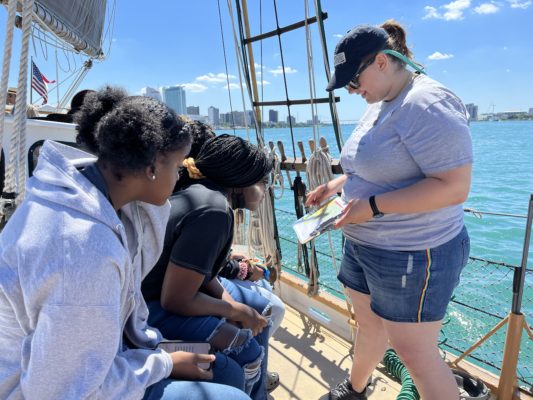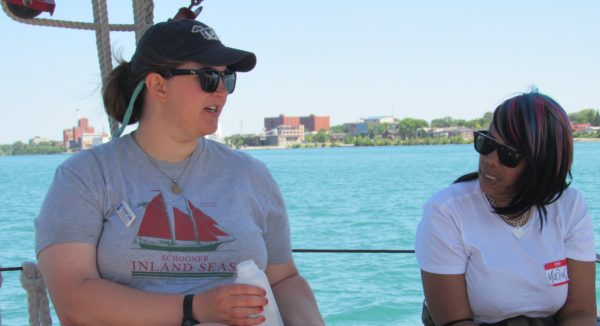As a grey sea of heavy clouds opened up to release a downpour of warm rain, cyclists and pedestrians fled the Detroit Riverwalk. Not far away aboard the Inland Seas, it was business as usual as we drifted through the rain past the Renaissance Center near downtown Detroit, plankton net swirling through the water as teenagers donned brightly colored raincoats. Leaning over to a nearby instructor, I smiled, saying “I’m so happy! The weather is perfect for my station today!”

I came to know Inland Seas Education Association via their partnership with the Detroit River Story Lab. I’m currently studying for a Master’s in Public Health, specializing in health behavior and health education, and my professional interests center around the integration of health education and environmental education. The unique opportunity to create a new station for the Detroit River Story Lab sails was a new challenge for me and I am so grateful for the experience this summer.
This partnership presented an opportunity to create a unique module for the Detroit River Story Lab sails, connecting participants in a personal way to their place in community health and the river system. Based on the Inland Seas teaching philosophies, the station also needed to be hands-on, relevant, and personally engaging. My favorite station in the spring season was water quality, so I decided to focus on the water quality of the Detroit River too. Did you know that the drinking water for Detroit and the surrounding area is sourced from 4 pump stations along southern Lake Huron and the Detroit River? My initial ideas about teaching about drinking water and the water cycle evolved into a station focusing on stormwater. We spent our time talking about the story of the water itself–where does it come from, and when it rains, where does it go?

The ‘watershed protection’ station was a hit with participants, and it was so fulfilling to help them with their hands-on activities. We looked at the Detroit area and identified each participant’s watershed on a map, creating a personal connection to the topic. Then together we constructed a water filtration system, using gravel, sand, activated charcoal, and filter paper to filter out dirty water. The students were often surprised that the system could filter out dirt, leaves, and food coloring to end in clear water! Students left with a better understanding of their personal connection to the river’s watershed, and how communities can reduce flooding by creating natural systems to divert, slow, and filter stormwater.
At the beginning of the spring when I told my advisors, friends, and family about spending my summer internship teaching science on a sailboat, the common refrain was “that’s cool, but why?” I’m so grateful that I was supported in pursuing this opportunity because introducing participants to the ways their health and their families are connected to the natural environment around them is so fulfilling to everyone involved. Many thanks to the staff, volunteers, coordinators, participants, and friends that were always willing to provide advice, support, and their own knowledge throughout the spring and summer. The watershed protection station and the successful Detroit River sails were products of too many people to list, and I’m grateful to all for their generous contributions.
Extra reading: Detroit River Story Lab; Clean water science kit
This blog was written by Crystal Cole, a summer education intern working with ISEA and the Detroit River Story Lab. Crystal is a graduate student, currently attending the University of Michigan School of Public Health as she pursues a Master’s of Public Health in health behavior and health education. She is also a Course Operations Specialist in Health Courses at the University of Michigan’s Center for Academic Innovation. Her professional and career goals center around integrating health and environmental education in appropriate, accessible, and affordable ways for learners close to home and around the globe. In her free time, she enjoys knitting and crocheting, kayaking, and exploring new-to-her food blogs.